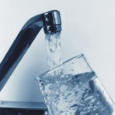Terrorists plan to attack Moscow water stations
It is not really easy to poison the Moscow water
 The Moscow interdepartmental anti-terrorist committee held a meeting devoted to the safety issues of the Moscow water against the background of recent terrorist attacks in Russia. As experience shows, after terrorist perform their attacks in crowded places, they switch their attention to city infrastructure objects of vital importance. Moscow vice Mayor Valery Shantsev believes that all dams and water intake constructions are safe enough. In addition, the official said, “it is impossible to poison such a vast amount of water in reservoirs of the Moscow region.”
The Moscow interdepartmental anti-terrorist committee held a meeting devoted to the safety issues of the Moscow water against the background of recent terrorist attacks in Russia. As experience shows, after terrorist perform their attacks in crowded places, they switch their attention to city infrastructure objects of vital importance. Moscow vice Mayor Valery Shantsev believes that all dams and water intake constructions are safe enough. In addition, the official said, “it is impossible to poison such a vast amount of water in reservoirs of the Moscow region.”
However, it was decided to take certain measures not to let terrorists attack the Moscow water. “Law-enforcement agencies guard all water intake areas, police officers patrol them, the 24-hour video surveillance is provided too. Specialists constantly supervise the quality of water, conduct the daily chemical analysis of water samples,” Valery Shantsev said. In addition, Moscow authorities plan to start using harmless hypocloride instead of poisonous chlorine to purify water.
”Hypocloride does not differ from chlorine as far as water purification is concerned. However, it will help diminish the danger of terrorist acts against waterwork stations,” a spokesperson for the press service of Moscow Water Channel company told the Izvestia. Hypocloride may cause only a slight chemical injury, if it appears in the atmosphere in its pure form, while the breathing of chlorine vapor leads to lethal outcome. In addition, it is not hard to disinfect a hypocloride-polluted territory – the chemical can be easily washed away with water.
It is not really easy to poison the Moscow water. Strongest poisons, such as potassium cyanide or prussic acid will naturally turn to harmless chemical compounds before they reach a water-purifying station. Potassium cyanide, for example, was neutralized with sweetness of a cake that was served to Grigori Rasputin. Toxins of biological origin can be totally destroyed when exposed to chlorine or ozone. If water-purifying devices work normally, one may not be concerned about the threat of being poisoned with drinking water. A discharge of highly poisonous chlorine at the stations poses a much bigger threat at this point.
Subscribe to Pravda.Ru Telegram channel, Facebook, RSS!





